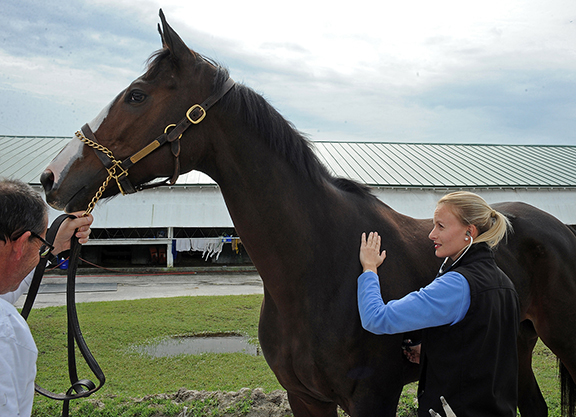By Jen Roytz
Whenever horses–or those stabled around them–are transported from one location to another, it presents an opportunity for the transport and proliferation of disease-causing agents. For Thoroughbreds, travel is often a regular occurrence, whether it be for competition, training, sale or breeding. Add to that the fact that many of the horses with whom they are transported, stabled or otherwise come in contact, have equally active travel schedules and it is easy to see how quickly a pathogen can potentially spread from a single horse to a group, barn or entire facility.
The American Association of Equine Practitioners (AAEP) and American Veterinary Medical Association (AVMA) recommends 5 core vaccines, meaning those that every horse should receive, regardless of movement, usage (competition, recreation, etc.) or exposure to other horses. These include rabies, West Nile virus, Eastern/Western equine encephalomyelitis and Tetanus.
Most facilities have minimum vaccination requirements for horses entering their stable grounds outside of these core vaccinations. It's important for horsemen to not only work closely with their veterinarian to be sure their horse maintains protection against the diseases to which it may have potential exposure, but also stay up-to-date regarding outbreaks and heightened threats in their area, says Dr. Robert Stout, State Veterinarian in Kentucky.
“Your veterinarian can tell you when to vaccinate to ensure maximum efficacy,” says Stout. “The season for West Nile Virus, for example, is summer and into fall, so the majority of horses are vaccinated at the end of March into April, so they have a heightened immune response in the height of the season.”
Other diseases, such as equine influenza and strangles, can be easily contracted and spread rapidly from horse to horse and throughout herds not vaccinated for the disease, resulting in not only the need for veterinary intervention, but time away from training and lingering side effects.
Outbreaks at several racetracks and training facilities in recent years have prompted most tracks, training centers and sales companies to mandate all horses entering their grounds be vaccinated for equine herpesvirus-1 (EHV-1), requiring that all horses receive the vaccine a minimum of 14 days, but not more than 120 days, prior to shipping into the stable grounds.
It is imperative, however, that horsemen maintain detailed records of such vaccinations and work with their veterinarians to proactively re-vaccinate to ensure their horses aren't left exposed.
“In theory, a horse can ship in having received the vaccination 90 days prior meets the requirements for entry, but say 40 days later, they are still stabled on the grounds, but no longer meet the requirements, putting themselves and those around them at risk,” said Rusty Ford, Equine Operations Consultant for the Office of the State Veterinarian. “Last year we started really emphasizing this to trainers, advising them that they need to keep close track of their health records to be sure they're staying up to date.”
Horsemen can also stay abreast of outbreaks in their area through email alerts from the Equine Disease Communication Center(EDCC), a national initiative that identifies and reports on disease outbreaks throughout the U. S., similarly to how the Center for Disease Control and Prevention (CDC) track and alert people about transmittable diseases in human populations.
Vaccinating horses against diseases is just one part of a comprehensive biosecurity plan, of which the EDCC can play an integral part, as it did it did this year for many horsemen. After an unusually wet start to 2018, Ford says his office saw an earlier identification of Potomac Horse Fever, a potentially fatal disease that often causes laminitis. The disease is caused by the ingestion by horses of caddis flies and mayflies, who often gravitate away from their native ponds and streams at night and toward light sources. As is the case with many other vaccines, horses vaccinated for Potomac Horse Fever are not uniformly guaranteed immunity from the disease, but rather their symptoms are often less severe if they do contract the disease.
“The alerts we send out to horsemen help them implement simple safeguards, like scheduling vaccinations based on heightened risk and, in the case of Potomac, turning off the lights before dark to prevent attracting aquatic insects into the barn,” says Ford. “Vaccinations are like a seatbelt in an automobile. It won't keep you from having a wreck, but it can lessen the severity.”
For a suggested vaccination schedule, which includes core and risk-based vaccines, visit aaep.org.
Not a subscriber? Click here to sign up for the daily PDF or alerts.






